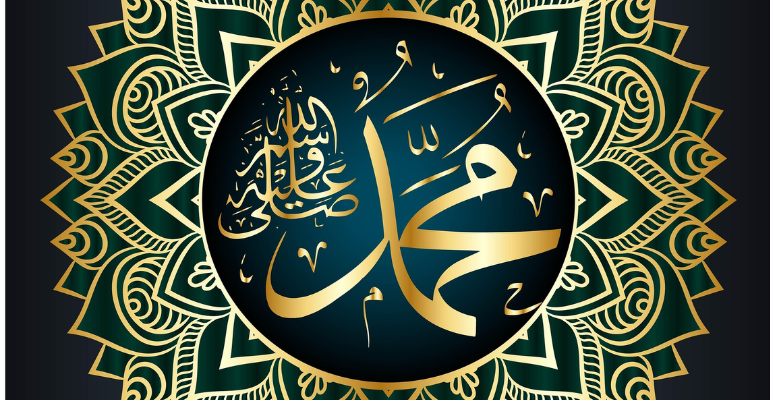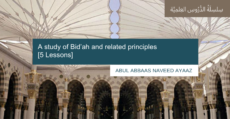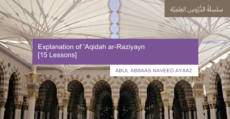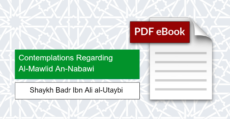In the name of Allāh, ar-Raḥmān (the most merciful), ar-Raḥīm (the bestower of mercy).
All praise is due to Allāh; May peace and blessings be upon our beloved Prophet and those who follow his guidance until the Day of Resurrection.
Below are eight common arguments people often use to prove the validity of celebrating the “Mawlid” [1], followed by concise responses:
1st Argument: The Mawlid is a Sunnah.
Response: Anything that is a sunnah of the Prophet ﷺ must be implemented, and its legislation accepted. Allāh, the most-high said,
{قُلْ أَطِيعُوا اللَّهَ وَالرَّسُولَ ۖ فَإِن تَوَلَّوْا فَإِنَّ اللَّهَ لَا يُحِبُّ الْكَافِرِينَ} آل عمران: ٣٢
{Say, ‘Obey Allāh and the Messenger.’ But if they turn away – then indeed, Allāh does not like the disbelievers} [03:32]
Also, the Prophet ﷺ ordered us to follow his sunnah and the sunnah of his companions. He said:
Upon you is my Sunnah, and the Sunnah of the Rightly Guided Caliphs. [2]
The argument that the Mawlid is a sunnah is easily tested: one only needs to ask for proof from the Sunnah showing that the Prophet ﷺ or his Companions ever celebrated his birthday. Yet, for those who make this claim, no such proof exists.
2nd Argument: 12th Rabi’ al-Awwal is the day the Prophet ﷺ was born, and we are merely showing happiness.
Response: Undoubtedly, it is an obligation upon every Muslim to be happy with the sending of the Prophet ﷺ, just as every Muslim must feel sadness upon his death. However, it has not been authentically established that he was born on the 12th of Rabi’ al-Awwal. Rather, what is known is that he died on this very day.
al-Ḥāfiẓ ibn Ḥajr said: “His death was on Monday without any disagreement in Rabi’ al-Awwal. This is almost a unanimous agreement… and according to Ibn Ishāq and the majority of the scholars, that it was on the 12th of [the month].” [3]
None of the ḥadīth collections mention that the Prophet ﷺ was born on the 12th of Rabīʿ al-Awwal. Instead, the books of history record differing opinions regarding the exact date of his birth. [4]
In any case, Allāh did not command us to commemorate the 12th of Rabīʿ al-Awwal—neither as a birthday nor as a death anniversary; neither with joy and celebration, nor with grief and mourning. The Companions did not set aside this day for happiness after the Prophet ﷺ, just as they did not set it aside for sorrow.
3rd Argument: The Prophet ﷺ mentioned his birthday; he said regarding fasting on Mondays, “It is the day I was born”. [5]
Response: In this ḥadīth, the Prophet ﷺ did not mention his birthday. A birthday refers to the specific day and year of a person’s birth, whereas he merely stated that he was born on a Monday – without specifying a date, month, or year.
Also, the companions, may Allāh be pleased with them, did not understand from the abovementioned ḥadīth that we should specify and celebrate the 12th of Rabi’ al-Awwal as a mawlid.
In reality, commemorating this day contradicts the very ḥadīth being cited. The ḥadīth teaches that the recommendation of fasting every Monday, as the Prophet ﷺ himself did. Yet those who celebrate the Mawlid abandon fasting on this day, replacing it with festivities, rejoicing, eating, and drinking. Thus, the ḥadīth stands as proof against celebrating the Mawlid and treating it as an ‘Eid. For it is well known that fasting is prohibited on the days of ‘Eid – so how could the Mawlid be considered an ‘Eid when the Prophet ﷺ fasted on that very day?”
4th Argument: Many miracles took place on the day the Prophet ﷺ was born, this shows we should celebrate it.
Response: A simple question may be asked: Were the Companions of the Prophet ﷺ aware of these miracles? If the answer is yes – and it is inconceivable to claim they were ignorant of them, then why did they not celebrate his birthday? Either they did not consider his birthday to hold religious significance, and therefore never commemorated it; or they did celebrate it, in which case proof must be provided. Yet no such proof exists.
5th Argument: Celebrating the birthday of the Prophet ﷺ is an act of love, and whoever does not celebrate it shows their lack of love.
Response: From the core pillars upon which the Islām of a person is based is loving the Prophet ﷺ. However, how is this love to be demonstrated?
Is it by adding to the religion what the Prophet ﷺ did not do? Is it by performing actions of “love” that his companions did not do? Is it by opposing his saying:
Indeed every bid’ah (innovation) is a misguidance, and every misguidance is in the Fire. [6]
Or is the love of Allāh and his Prophet ﷺ demonstrated through following his sunnah and abandoning every bid’ah (innovation)?
Allāh, the most-high, said,
{قُلْ إِن كُنتُمْ تُحِبُّونَ اللَّهَ فَاتَّبِعُونِي يُحْبِبْكُمُ اللَّهُ وَيَغْفِرْ لَكُمْ ذُنُوبَكُمْ} آل عمران: ٣١
{Say: If you truly love Allāh then follow me; He will love you and forgive your sins} [03:31]
Moreover, if failing to celebrate the Mawlid were considered bad manners, would that imply that the noble Companions ﷺ also acted with bad manners by not commemorating it?
In reality, we refrain from celebrating his birthday precisely out of love for him and adherence to his Sunnah, rejecting all forms of bid‘ah. There is no greater demonstration of true love and devotion than following his way.
6th Argument: The Prophet ﷺ will save us from the Fire, and therefore, we should celebrate his birthday
ٌResponse: Allāh alone determines who is admitted to Paradise and who is consigned to the Fire; this authority is not to be attributed to the Prophet ﷺ or to anyone else. Allāh says, addressing his Prophet ﷺ:
{Then, is one who has deserved the decree of punishment [to be guided]? Then, can you save one who is in the Fire} [39:19]
The one who saves us from the Fire is Allāh alone; He has no partners. As for the Prophet ﷺ, he was sent solely to convey the message of Allāh, as a bearer of glad tidings and a warner of severe punishment. Allāh will honour the Prophet ﷺ with the intercession on the Day of Resurrection, yet this intercession will be granted only for the people of tawḥīd.
7th Argument: What is wrong with reciting the Qur’ān, being happy and sending salām upon the Prophet ﷺ? This is what we do in the Mawlid.
Response: There is nothing wrong with reciting the Qur’ān, studying the Sīrah, reading poetry, or sending salām upon the Prophet ﷺ. The innovation lies in assigning a specific day, time, or place for these acts of worship – something the Prophet ﷺ never prescribed. He said:
Whoever innovates an action into this affair of ours (i.e. Islām), will have it rejected. [7]
Thus, specifying a particular day or date for these acts of worship is a bid‘ah and is rejected by Allāh—even though the original actions, such as reciting the Qur’ān or sending salām upon the Prophet ﷺ, are good. This is analogous to someone designating a specific day and urging people to perform a hundred nafl rak‘ahs: while nafl salāh itself is prescribed, imposing a special day for it constitutes a bid‘ah.
Secondly, it is wrong to say that the Mawlid is merely reciting the Qur’ān, happiness and salām. Rather, food, music, shirk, bid’ah, wastefulness and extravagance, marching in the street, and free mixing often take place.
8th Argument: Celebrating the Mawlid is a good innovation – a ‘bid’ah ḥasanah’.
Response: This doubt itself contradicts the first claim that the Mawlid is a Sunnah. If it were indeed an established Sunnah, it could not simultaneously be a bid‘ah – good or otherwise – and vice versa. Those who celebrate the Mawlid must therefore decide whether it is a Sunnah or a bid‘ah.
Regarding this matter, there is nothing in Islām that can be classified as a ‘good innovation.’ All acts of worship introduced as innovations are considered blameworthy, as they involve altering or adding to the religion of Allāh.
Those who cite statements from some scholars about a ‘good bid‘ah’ often misunderstand the concept. The bid‘ah that is rejected refers to introducing any act of worship into Islām without evidence, or ascribing it as part of Islām – such as designating an ‘Eid.
Furthermore, if the Mawlid were a good innovation, why did it only appear in the sixth century? Why did the Companions—who were the most devoted to the Prophet ﷺ – not innovate it? It was not commemorated by the great Imāms, scholars, and fuqahā of the first three centuries, such as Abū Ḥanīfah, Mālik, Shāfi‘ī, Aḥmad Ibn Ḥanbal, al-Bukhārī, Muslim, and others.
Had there been any benefit or virtue in the Mawlid, surely the great Imāms and scholars of the early generations would have celebrated it as well.
May Allāh guide us all to the true love of the Prophet ﷺ, implementing his sunnah and avoiding all innovations. May peace and blessings be upon our beloved Prophet, his family and companions. [8]
Written by:
Abul Abbaas Naveed Ayaaz
3rd Rabee’ al-Awwal 1435h, corresponding to 4th January 2014
Nelson, Lancashire.
Footnotes:
[1] al-Mawlid an-Nabawi is the Arabic term for specifying a particular day in a year to commemorate the birthday of the Prophet ﷺ, just as Christians specify 25th December to celebrate the birthday of Prophet ‘Eesa. The day often specified is 12th Rabi’ al-Awwal.
[2] Narrated by ‘Irbad ibn Sāriyah; Collected by Abū Dawūd & at-Tirmidhī.
[3] al-Ḥāfiẓ Ibn Ḥajar; Fatḥ al-Bārī Vol. 7 Page. 736
[4] Refer to the following article for a more detailed analysis of the opinions regarding the birth of the Prophet ﷺ: https://madeenah.com/was-the-prophet-born-on-the-12th-of-rabi-al-awwal/
[5] This ḥadīth is narrated by Abu Qatādah and compiled by Muslim. A Bedouin came to the Prophet and asked him about fasting on Monday, to which the Prophet ﷺ replied,
That is the day I was born on, and the day that the revelation began.
[6] Narrated by ‘Irbad ibn Sāriyah; Collected by Abū Dawūd.
[7] Narrated by ‘Āisha; Collected by Muslim.
[8] These doubts were paraphrased from al-Ḥabīb ‘Ali al-Jifrī, the well-known caller to shirk and bid’ah. Please refer to: ar-Radd ash-Shāfī ‘alā al-Jifrī by Shaykh ‘Ādil al-Furaydān. In it, he refutes the doubts of al-Jifrī regarding Mawlid an-Nabawi.
An online PDF version is available from: http://ia600406.us.archive.org/4/items/zaq24/zaq24.pdf






